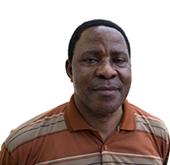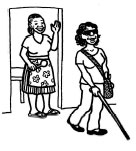Your progress
0%
Listed below are a number of activities that CBR can undertake to support rehabilitation for people with disabilities in the communities they serve.
Use your mouse or keyboard to expand each of the activity headings below. To add an activity to your action plan, select the Add button beside it.

Before making a rehabilitation plan and starting activities, it is important for CBR personnel to carry out a basic assessment with an individual and family members to identify needs and priorities. Assessment is an important skill, so CBR personnel should receive training and supervision to ensure competence in this area.
To identify a person’s needs, it can be helpful to consider the following questions.
Accurate information can be obtained by:
It is important to keep a record of the initial assessment and future consultations, so that an individual’s progress can be monitored over time.
If, following the basic assessment, CBR personnel identify a need for specialized rehabilitation services, such as physiotherapy, occupational therapy, audiology and speech therapy, they can facilitate access for people with disabilities by initiating referrals. The following activities are suggested.
Specialized rehabilitation services are often based in large urban centres, and this can restrict access for people living in rural and remote areas. Consideration must be given to the costs associated with a visit to the city, including transport, food, accommodation, loss of daily wages and any out-of-pocket payments that may be required.
CBR organizations should be aware of financial constraints and ensure that a wide range of options are investigated, including government and nongovernmental schemes, bank loans and community support.
Learn how the Islamic Republic of Iran uses a mobile team of rehabilitation specialists to bring rehabilitation services as close as possible for those who need them.


CBR in the Islamic Republic of Iran encourages village health workers and CBR personnel to identify people with disabilities early and refer them to the primary health-care services in the community. Following referral, a mobile team of rehabilitation personnel visit the home to provide home-based rehabilitation.
If specialized interventions are required, referral is made to a tertiary-level care centre, usually in the provincial headquarters or capital city. Following rehabilitation at a specialized centre, people are referred back to the primary health-care services, which work with the CBR to ensure that rehabilitation activities are continued, if necessary.
The mobile team provides follow-up to monitor progress and provide further assistance when required.
CBR can facilitate home and community-based therapy services and provide assistance to people with a wide range of impairments, enabling them to maintain and maximize their function within their home and community.
Provide early intervention activities for child development
Every child goes through a learning process enabling him or her to master important skills for life. The major areas of child development include:
Delays in development occur when a child is unable to reach important milestones appropriate to his or her age group. Through early intervention, children with, or at risk of, developmental delay are identified as early as possible and provided with focused rehabilitation interventions to prevent or mitigate this delay.
The presence of a disability can result in developmental delay and restrict a child’s ability to participate in regular activities such as playing with other children and going to school.
CBR personnel can provide early intervention activities, usually home-based, to encourage simple and enjoyable learning opportunities for development. CBR can also encourage parents to meet together to share ideas and experiences and facilitate playgroups, so their children learn to play with other children, learn new skills and improve in all areas of development.
See how a CBR in Egypt organized family fun days to promote the intellectual development of children with disabilities.


CBR in Alexandria, Egypt, has several clubs that meet weekly in different parts of the city, including in a local stadium and a mosque.
Parents come with their children who have disabilities to participate in activities organized by CBR and community volunteers. There is a range of fun activities for children such as singing and dancing contests and parents are given the opportunity to talk and share their experiences with one another and to attend training sessions.
Encourage functional independence

Functional interventions aim to improve an individual’s level of independence in daily living skills, such as mobility, communication, bathing, toileting, dressing, eating, drinking, cooking and doing housework. Interventions are dependent on a person’s age, gender and local environment and will change over time as he or she makes the transition from one life stage to another.
CBR personnel can provide:
See how a CBR staff member was able to convince the mother of a blind woman in Guyana to allow her daughter to travel outside her home independently.


Shirley lives in a village in Guyana. She is blind and because of this her mother was afraid to allow her to go outside the house alone.
When CBR volunteers visited Shirley’s house, they talked to her mother and said that it was possible to teach Shirley how to move outside independently. It was difficult to convince Shirley’s mother. The CBR volunteer asked Pauline, a CBR regional coordinator, to visit the house. As Pauline was blind herself, the CBR volunteer thought that she would be a good example and motivator for both Shirley and her mother.
Shirley’s mother agreed and a rehabilitation plan was made to facilitate greater functional independence for Shirley. Shirley made rapid progress and is now able to move around her community independently with the help of a white cane. She has become an active member of the local CBR committee and a member of the disabled people’s organization.
Facilitate environmental modifications
Environmental modifications may be necessary to improve the functional independence of a person with a disability. CBR personnel may facilitate environmental modifications in the home, such as ramps for wheelchair access, handrails near steps, toilet adaptations and widened doorways, or at community level by advocating for the modification of the school environment, public buildings or workplaces.
See how different groups and individuals within a community worked together to improve the life of a woman with a spinal cord injury.


Safia Khatun, a young adult with spinal cord injury, lives in a remote village of West Bengal with her aged mother and the families of her two brothers. Her mother gets a small monthly pension from the local government. Both of her brothers are engaged in tailoring.
When Safia was 14 years old, she fell from a height while cleaning her house and had a spinal cord injury. She was immediately admitted in the nearest government hospital for intervention. When she was discharged the lower part of her body was paralyzed and there was no sensation. She had lost control of her bladder and bowel.
When she came in contact with the CBR team, she was engaged in ‘zari’ work, which is a popular trade in that community. Being seated for a long time in the same place, she had developed pressure sores. She was taken to a specialist doctor who advised regular dressing and the use of a water bed. The CBR team managed to get her a water bed.
One of the major problems was the toilet. The toilet in Safia’s house was not accessible due to the design and the distance from the house. Safia used to bathe in a pond twice a week even in summer. Her brother’s families are separated and busy with their own work. So, her aged mother had to carry her to the pond side for bathing. The CBR team spoke to her mother and other family members.
Safia was a member of the local Disability Rights Group, where her situation was discussed. The group, along with the CBR team, took up the issue with the family, local authorities and the community at large. It was decided that a bathing place would be constructed for Safia beside her room and her sister-in-laws agreed to fetch the water from pond.
The CBR team obtained a bed pan and, along with the Disability Rights Group members, mobilized raw materials for the construction of the bathing place from a local businessman. One of Safia’s brothers, who is a mason, did the construction work.
Safia was thrilled with the changes. She now could use the bed pan and use the wash facilities on her own, with privacy and little or no support.
The Disability Rights Group has also approached the local government about providing a toilet for Safia. They have put her name in the priority list.
Link to self-help groups
CBR promotes self-help groups where people with similar impairments or similar rehabilitation needs come together to share information, ideas and experiences.
CBR can encourage interactions between these groups and rehabilitation professionals to enable mutual understanding and collaboration.
Learn how CBR in India organized information sessions for a group of individuals who were afraid to travel to a hospital for appointments.


CBR in a poor area of Greater Mumbai, India, often involves staff from rehabilitation institutions as trainers and teachers for CBR personnel.
CBR found that many families with people with disabilities were afraid to go to referral hospitals for ear, nose and throat (ENT), or ophthalmology care. So visits to referral hospitals were organized for small groups of people with disabilities and their family members, to explain how these hospitals worked and how people could access the different services.
Some professionals from the hospitals were also invited to cultural events organized by the CBR and given community recognition for their support. Many specialized hospitals agreed to charge subsidized fees for people referred by CBR.
Disability booklets and manuals can be a useful tool for rehabilitation. These resources can be used by CBR personnel and by people with disabilities and their family members to guide rehabilitation, particularly where access to rehabilitation professionals is limited.
These resources may also provide valuable information for the wider community, as well as for the many different services and sectors involved in rehabilitation activities. The following CBR activities are suggested.
See how CBR in Viet Nam translated materials into Vietnamese to make them more usable.


CBR in Viet Nam translated several existing publications — including the WHO CBR manual — into Vietnamese for local use.
In addition, they developed their own materials on specific concerns for people with disabilities and their caregivers.
Health workers are always provided with two copies of any resource material – one copy for themselves and one copy for the people they are visiting.
CBR can provide education for rehabilitation personnel to raise their awareness of the role of CBR and how it can help them to optimize their services.